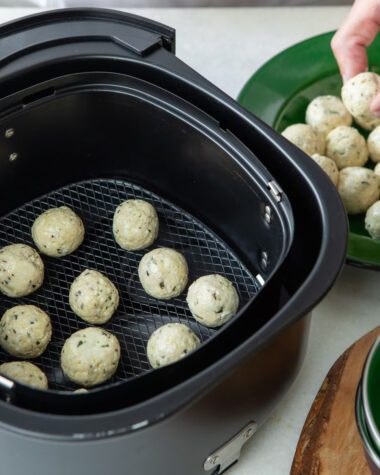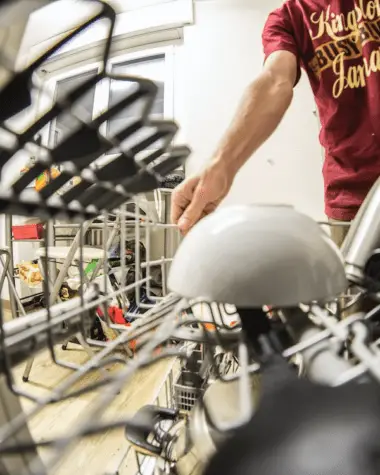Nearly every household keeps eggs in the refrigerator, and just like everyone, we make it a point to always keep a carton of them on standby. We use hard-boiled eggs for a quick morning meal, a protein-rich snack, a pan of creamy scrambled eggs for dinner, or a quick batch of lovely chocolate chip cookies. Plus, eggs last for some time, although not forever, so it’s great to have this at home. But for how long do eggs last in your refrigerator?
This May Also Interest You: The Ugly Truth About The Lifespan Of Leftovers, Backed By Science
Don’t worry; we at DaDongNY will review everything you should know regarding the best way to keep eggs and identify if eggs are still good for consumption.
Eggs Don’t Often Go Bad If Preserved In The Right Way
According to the U.S. Department of Agriculture (USDA), eggs last for three to five weeks if stored in a refrigerator at no more than 40 °F. They’ll likely go bad during this period; nevertheless, you can still consume them. Keep in mind that the sell-by date does not suggest that the eggs are no longer available to eat.
How Much Time Do Eggs Keep In The Refrigerator And Freezer Compartment
| Eggs | Refrigerator Compartment (40°F) | Freezer Compartment (0°F or colder) |
|---|---|---|
| Raw eggs (in a shell) | 4 to 5 weeks after pack date; about 3 weeks after purchase | Not recommended |
| Raw eggs (lightly beaten or out of the shell) | Up to 2 days | Up to 1 year |
| Raw egg yolks | Up to 2 days | Up to 1 year |
| Raw egg whites | Up to 4 days | Up to 1 year |
| Hard-boiled eggs (in a shell) | Up to 1 week | Not recommended |
| Hard-boiled eggs (peeled) | Up to 1 week (best used in 1 day) | Not recommended |
This May Also Interest You: Why Should The Refrigerator And Freezer Be This Cold (A Guide)
Whole Eggs
Whole eggs can last four to five weeks after packaging, or around three weeks if stored within their original packaging, inside the refrigerator shelf, and kept away from aromatic things such as cheeses and onions.
When stored and managed properly, eggs seldom go bad. This means they could still be okay for consumption and cook until a few months after their expiration date.
Egg Yolks
Egg yolks can be stored in the refrigerator for two days. When egg yolks are removed from their protective shells and exposed to air, they grow thinner and runnier.
Egg Whites
Egg whites can be preserved by being stored in the refrigerator for no more than four days. They must be kept in a sealed, air-tight container. Otherwise, the egg whites tend to get less thick and more bouncy after being removed from the shell; nevertheless, they are still safe for consumption.
Hard-Boiled Eggs
Hard-boiled eggs can be stored in the refrigerator for seven days, whether peeled or unpeeled. Remember that peeled hard-boiled eggs may collect aromas from the fridge, so use them immediately within a day of cooking.
Furthermore, keep peeled eggs within an air-tight container or zipped bag. Unpeeled eggs aren’t supposed to be refrigerated if the temperature is over 40 °F.
Refrigerator Compartment Storage
As mentioned earlier, you must refrigerate eggs at temperatures no higher than 40°F. Keep them on an interior shelf, away from aromatic foods, in their original carton. The temperature on the inside shelf is more secure than one on a doorway, which is frequently opened and closed. The carton keeps the eggs from absorbing aromas or flavors from various foods while helping retain moisture.
Raw eggs should also be refrigerated in an air-tight and firmly sealed container after being removed from their shells. Refrigerated egg yolks must be kept covered in water to avoid drying out; drain before using.
Freezer Compartment Storage
If you have more eggs at your disposal for a couple of weeks, you might want to freeze them whole. Keep in mind that only fresh, clean eggs should be frozen. Fill freezer containers halfway with eggs, whites, or yolks, and mark it with the total number of eggs, whites, or yolks and the date. Refrigerate frozen eggs overnight to defrost.
When egg yolks are frozen, they thicken. Before freezing, add 1/8 teaspoon salt or 1-1/2 tablespoons sugar or corn syrup per 14 cup yolks to prevent gel formation. On the label, indicate “with salt” for main meals and “with sugar” for desserts.
Other Effective Ways Of Storing Raw And Cooked Eggs
- We suggest you always keep your eggs in their original packaging. The carton covers the eggs and keeps them safe from absorbing unpleasant smells and flavors from other items in your fridge via the eggshell’s hundreds of small pores. They also make sure that the best before the date is always visible to you so that you can ensure freshness.
- You might notice an unpleasant odor in your refrigerator after storing hard-boiled eggs. The odor is generated by hydrogen sulfide, which is produced while cooking eggs. It’s completely harmless and usually goes away after a few hours.
Is It Necessary To Keep Eggs Refrigerated
To put it simply, yes. In the United States, eggs supplied to consumers must be refrigerated immediately. They are also cleaned and sterilized as soon as they are laid in order to avoid Salmonella contamination. While this process kills bacteria, it also removes an egg’s protective shell, allowing it to be stored properly at room temperature. As a result, eggs could now be kept inside the refrigerator at 40 °F or even lower.
This is not the case for farm-fresh eggs because their naturally protective outer layer remains intact since they are not washed and sterilized. This layer aids in the prevention of bacteria transfer from the shell to within the egg.
How To Tell Whether Your Eggs Are Still Good For Usage
Rather than looking at the sell-by or the expiration dates, check the package’s date on the carton to determine if the eggs are still good. The pack date is typically printed through the Julian Calendar. This is a three-digit number that indicates the day the eggs had been washed and packed. For instance, eggs packed on the first of January would be labeled 001, whereas 365 indicates December 31.
Use sensory cues whenever you can. If the egg is clean, without cracks, and does not smell bad when opened, it is considered safe for human consumption. Otherwise, eggs past their sell-by date will have an unpleasant odor.
FAQs
- Can I Eat Eggs That Have Gone Over Their Sell-By Date?
Yes, eggs can often be consumable even after their expiration date. Old eggs are sometimes awful. They are less fresh than a brand-new egg from the shop.
The easiest approach to determine whether an egg is safe to eat is by relying on your sight and nose. Is there any odd coating or cracks in the shell of the egg? If so, discard it away.
Crack the uncooked eggs onto a platter and take a whiff of them. A rotting or bad egg has a unique odor. If your egg has that odor, it’s time to say goodbye to it.
- What Can I Make Out Of Old Eggs?
Bad eggs are different from old eggs. Old eggs are frequently okay to use in various meals and recipes. However, egg quality declines over an extended period, and the distinctive high-rise yolk might have been lost in eggs sitting in your refrigerator for a while. But don’t worry; old eggs may nevertheless shine.
Some people, for example, like to hard-boil older eggs. As the egg ages, the bubble inside the shell increases, making it peel smoother. Use these eggs to make egg salad, or devilled eggs, or just enjoy them as a quick snack.
Bottomline
If you throw away your eggs after the expiration date on the carton, you may be wasting perfectly good eggs. Eggs can be stored properly for at least four to five weeks in your refrigerator and up to a year in the freezer compartment.
The longer an egg is held, the lower its quality, making it less bouncy and runnier. However, older eggs can still be used for a variety of purposes. They are great for boiling and making omelets, eggs that have been scrambled, or baked dishes containing eggs.
If you’re still unsure, we hope the information above clarifies everything you need to know about the egg’s longevity in a refrigerator.
To learn more about refrigerators and how this valuable piece of equipment chills the food and beverages inside, including your breast milk, check out the post here.
Articles You May Be Interested In
- A Cooler Choice: Whirlpool v.s GE Refrigerators (Full Guide)
- Refrigerator Check: LG v.s Samsung Refrigerators (Full Guide)
- Cool Tech Showdown: Frigidaire v.s Whirlpool Refrigerators (Full Guide)
- Fridge Favorites: Bosch v.s LG Refrigerators (Full Guide)
- Cooling Conundrum: Whirlpool v.s Samsung Refrigerators (Full Guide)
- Tale Of The Tape: Maytag v.s Whirlpool Refrigerators (Full Guide)
- Fridges in Focus: Thermador v.s Sub-Zero Refrigerators (Full Guide)
- Fridge Frenzy: Sub-Zero v.s Viking Refrigerators (Full Guide)
- The Big Chill: Whirlpool v.s KitchenAid Refrigerators (Full Guide)
- Refrigerator Bout: Whirlpool v.s LG Refrigerators (Full Guide)









